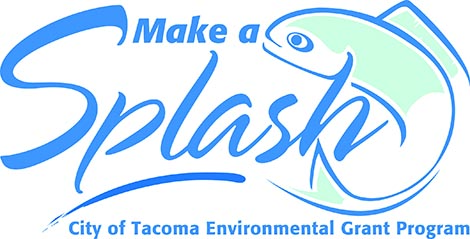
Some changes in how you maintain and care for your garden or yard can help it look good, give you more time to enjoy it, and score points for the environment.
Pointers on how to do all that are available at the City of Tacoma EnviroHouse, a model home showcasing green building and natural-landscape ideas.
By championing the benefits of sustainable living, EnviroHouse – a program of the city’s Environmental Services Department — plays a key role in helping homeowners, builders, and landscapers minimize, if not eliminate surface-water runoff that can pollute waterways, including Puget Sound. Gardening techniques that are spotlighted include:
- A water-efficient irrigation system that uses low-evaporation spray heads and drip irrigation that applies water to the root zone, avoiding wasteful runoff
- An irrigation controller that applies water according to the weather.
- Rain barrels barrels to capture and recycle rain water.
- Native/adaptable plants that prevent erosion and flooding and improve water quality.
- Composting that helps make landscaping weed-resistant, reducing the need for chemical fertilizers and pesticides that can make their way into water systems.
The less water that’s spent on gardens and landscaping, the better for the environment. Water is critical throughout the life of a plant, but deciding when and how much water to provide each plant can be a bit overwhelming. The task can be easier with simple strategies that conserve water and guard against runoff.
Start by selecting plants suited to your climate, soil moisture and average rainfall.
Next, incorporate organic matter such as compost into the soil prior to planting. This helps the soil absorb rainfall and irrigation water. Less runoff means less water wasted. Adding organic matter also increases the ability of fast-draining soil to hold moisture, extending the time between watering.
Check out the TAGRO (short for “Tacoma Growâ€) soil products marketed by the City of Tacoma. Made from wastewater byproducts called biosolids and other weed-free gardening components, TAGRO has the U.S. Environmental Protection Agency’s highest rating for use in landscaping and vegetable gardens and gets rave reviews from customers. (For information about TAGRO or to place an order, call 253-502-2150).
Mulch the soil with organic materials such as shredded leaves, evergreen needles or woodchips. Mulching helps conserve moisture while suppressing weeds and improving the soil as it decomposes. Plus, you’ll be recycling landscape trimmings back into the landscape and the environment. Green gardening!
Providing the right amount of water at the right time can be a challenge. Doing it efficiently to avoid wasting time or water can help ensure your gardening success.
You can see efficient watering systems in action at EnviroHouse, which features a fully integrated rainwater management system that starts by collecting rainwater in roof gutters, then into rain barrels that are linked to provide water for the yard and landscaping that can be controlled by the weather. This water-efficient system features low-evaporation spray heads and drip irrigation that applies water directly to roots to greatly reduce wasteful runoff.
Stormwater runoff from homes, streets, sidewalks and parking lots is the main source of pollution in Commencement Bay and Puget Sound, so EnviroHouse was designed to minimize its impact with a rain garden that deals with all runoff that isn’t used for irrigation.
EnviroHouse also displays examples of permeable pavers and pathways that absorb and filter runoff, as well as direct it into a rain garden. Also on display are examples of non-toxic paint, siding, and roofing that can greatly reduce the pollutants and chemicals that get into stormwater runoff.
You can see it all for yourself at 3510 S. Mullen St., where EnviroHouse is open to the public Wednesday through Friday from 10 a.m. to 3 p.m. and on weekends from 11 a.m. to 5 p.m.
The use of appropriate irrigation, mulching and organic matter can make a huge difference in the quality and enjoyment of your garden and landscaping. And the environment will thank you.
Melinda Myers, a gardening expert and writer who has written more than 20 gardening books, contributed to this report.